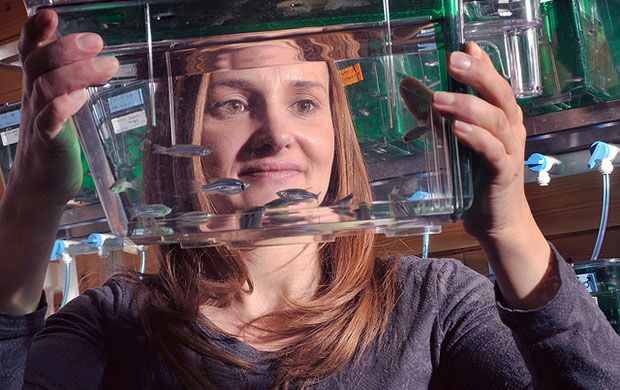MDI Bio Lab researcher IDs two drug candidates for chemo side-effect
 PHOTO COURTESY / MDI Biological Laboratory
Assistant Professor Sandra Rieger, looks at at tank of zebrafish. The fish are commonly used for lab research including research to reverse peripheral nerve damage, a common side effect of chemotherapy.
PHOTO COURTESY / MDI Biological Laboratory
Assistant Professor Sandra Rieger, looks at at tank of zebrafish. The fish are commonly used for lab research including research to reverse peripheral nerve damage, a common side effect of chemotherapy.
A Mount Desert Island Biological Laboratory researcher has discovered two potential drugs that might be used to reverse peripheral nerve damage, a common side effect of chemotherapy.
The laboratory filed a provisional patent for the drug candidates in early February. Assistant Professor Sandra Rieger, PhD, identified the drug candidates, which will be advanced through MDI Biological Laboratory’s first spin-off company, Novo Biosciences, with the aim of getting them into patient clinical trials.
The lab said that if the drugs prove to be effective at treating the nerve damage, they will be licensed to a pharmaceutical company for additional studies to get to the point where they are approved for use in humans by the U.S. Food and Drug Administration..
Novo, a for-profit regenerative medicine company, was founded in early 2013 by lab President Kevin Strange and regenerative biology researcher Voot Yin, both of whom were 2013 Mainebiz Next award winners. Novo was the first spin-out in the lab’s 115-year history.
“Once we’ve completed our studies on mammalian models, we’d like to collaborate with a medical institution or pharmaceutical company on clinical trials in humans,” Rieger said in a prepared statement.
She said a single drug probably won’t be able to treat all the different types of peripheral nerve damage, so she is using zebrafish, an animal used commonly for lab research, to discover other possible drug candidates to treat the affliction.
Such nerve damage occurs after chemotherapy treatment for ovarian, breast, lung, pancreatic and other cancers. It also occurs in diabetics and those with traumatic injuries.
“Currently, there is no effective treatment for the underlying causes of peripheral neuropathy (nerve damage), which affects 30% to 40% of chemotherapy patients,” Strange said in a statement. “Our hope is that Dr. Rieger’s work in the zebrafish model will lead to an effective treatment for this condition, which can cause disabling difficulty in carrying out everyday activities such as walking, writing, getting dressed and handling small objects.”
Zebrafish share 70% of their genes with humans, which is why Rieger used them as a research model. She does plan to test the drug candidates further in mice and/or rats and in human skin.
Peripheral nerve damage can cause pain, numbing, tingling, temperature sensitivity and muscle weakness. If the damage is severe, it can lead to serious problems like falls, heart-rate or blood-pressure changes, difficulty breathing, paralysis or even organ failure.
The two drug candidates could potentially reverse nerve damage, according to the lab.
Current treatments are aimed at relieving pain from nerve damage, according to cancer.org. The approaches include steroids, numbing medicines, antidepressants, anti-seizure medicines and opioids or narcotics.
Read more
MDI lab launches regenerative tissue spinoff
New collaborations, incubators aim to breathe life into Maine's biosciences










Comments